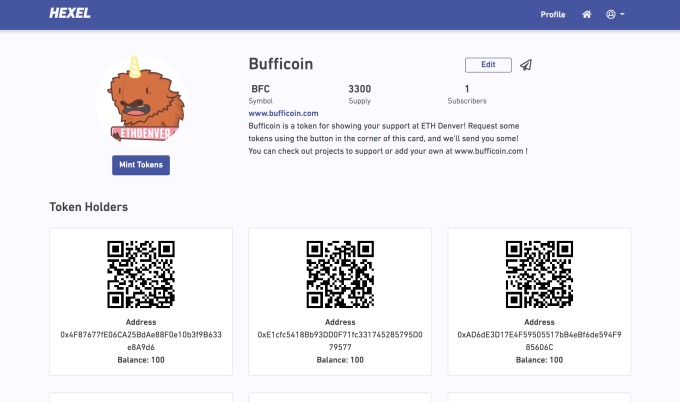![]()
What if it look like if the majority of newly issued ERC-20 tokens were used for good, instead of scammy ICO evil? One Y Combinator-backed startup that thinks they have an answer to this question.
Meet Hexel, a startup that that wants to make it easy for anyone to use Ethereum-based tokens to engage their hyperlocal community. For example, a restaurant could use Hexel’s free tool to create and distribute a token as part of a rewards program, or a university could have their own token used as part of an on-campus economy.
John Palmer, founder of Hexel explained that he sees a whole set of use cases for tokens that haven’t been explored yet – like these hyperlocal community tokens. “Tokens can bring a unique and fun element into transactions that would otherwise feel too formal if cash was used,” Palmer said.
To interact with Hexel you need to have a MetaMask wallet connected to the Ethereum network, since these newly issued tokens literally live on the Ethereum Blockchain.
After signing an initial transaction and creating the ERC-20 token you can “mint” them by conducting an airdrop – i.e picking how many tokens you want to distribute and pasting in your friend’s Ethereum address. Hexel’s dashboard shows you the addresses of anyone that holds your token and their balance, so you can track your new mini economy in real time. The platform also has a page where you can see all the existing tokens created on Hexel.

Of course being run on the Ethereum blockchain also has some downsides – mainly that users have to pay a transaction fee anytime they interact with the network, meaning that both creating tokens and airdropping them to friends cost real Ether.
In a perfect world this would only cost a few cents worth of ETH for each transaction, but network congestion typically means you’ll end up paying more. For example, I wasn’t able to distribute super-rare FitzCoin tokens to friends without manually increasing the gas limit on Meta Mask to a dollar or so.
This all isn’t the most intuitive, especially for someone who has never interacted with Ethereum and just wants to create a loyalty token for their corner store. Palmer admitted that Hexel is going to be much easier to use for people who have already interact with the Ethereum network before, but noted that they’re trying to figure out alternatives, like potentially creating a new wallet for users that would live on the Hexel site.

